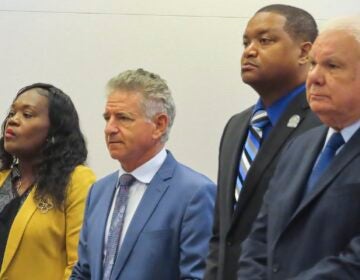Cherry Hill police continue videotaping people in bathrooms, but with safeguards and signs
A Philadelphia woman who sued after she was videotaped using a toilet at the Cherry Hill police station, has settled her case. A federal judge in Camden has approved the agreement–ending a privacy rights battle that began in 2009.After Gretchen Winterbottom was arrested for drunken driving, she used the holding-cell toilet at the Cherry Hill police station. Her lawyer Philip Fuoco says his client didn’t know she was being taped.”As a result of normal discovery in the underlying case that she had been charged with, she received this DVD and at that time neither she nor her lawyer knew that anyone was being videotaped while using toilet facilities,” said Fuoco.Fuoco says the case was brought not to get money, but to change policy.John Gillespie, the attorney for Cherry Hill Township, says police need video surveillance to maintain safety in the station.”I think you always have to expect you’re going to be monitored, you’re going to be observed, particularly if you were arrested for driving under the influence,” said Gillespie.Gillespie says police have a duty to monitor people in custody.”The video camera is active and is triggered when you go into the facilities,” said Gillespie. “It’s a running loop. It’s not something, we have someone who can sit in a room and control that tape. Remember these people are under arrest, they are in police custody so we have to keep an eye on them and make sure they don’t harm themselves or harm evidence.”Gillespie says the Township decided to make changes at the police station, rather than fight in court. Before the changes–when Winterbottom was videotaped–Gillespie says police could see a person’s head or maybe shoulders, but their private parts were blacked out. Now that black bar has been expanded to cover more. “We put tape on the floor around the toilet so that folks will know that if you are outside of that area, you are more than likely more fully exposed than you are while you’re within that area surrounding the toilet,” Gillespie said.Gillespie says they also posted signs notifying people they’re being videotaped. While the case is not legally binding on other police departments, Gillespie says he received a call from a lawyer in Illinois about a similar case who wondered how Cherry Hill dealt with the situation. The judge granted Winterbottom $7,000 as well as $31,000 for legal fees.
WHYY is your source for fact-based, in-depth journalism and information. As a nonprofit organization, we rely on financial support from readers like you. Please give today.




